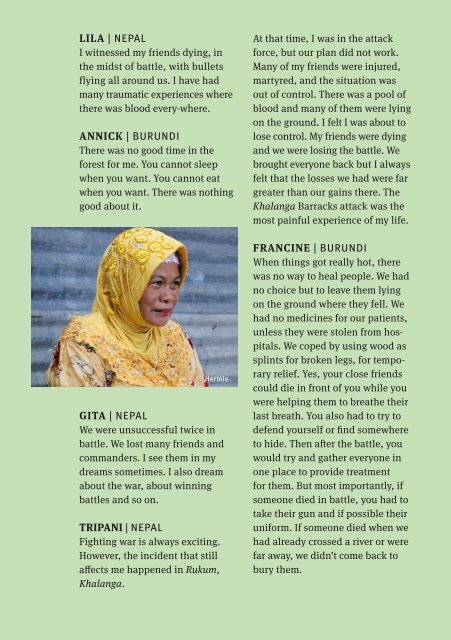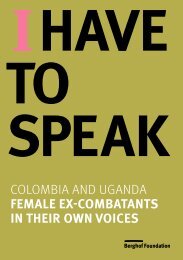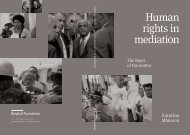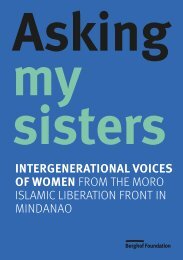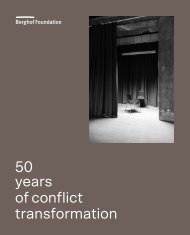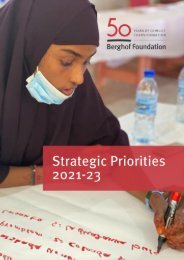I Have To Speak: Voices of Female Ex-Combatants from Aceh, Burundi, Mindanao and Nepal
This booklet seeks to amplify some of the hidden and forgotten voices in conflict. These stories of female ex-combatants from diverse political, religious, ethnic and national backgrounds show that women and their experiences of armed conflict have to be taken seriously for building sustainable peace. These are their stories as they tell them to each other. Six ex-combatant women collected the stories, reflecting as they did so on their reasons for joining the movements, their time as women in war, and how their lives unfolded once peace was restored. Theirs are stories of friendship and camaraderie, of life and death, of perseverance and resistance, and of rebuilding lives after war and continuing the struggle in peaceful ways.
This booklet seeks to amplify some of the hidden and forgotten voices in conflict. These stories of female ex-combatants from diverse political, religious, ethnic and national backgrounds show that women and their experiences of armed conflict have to be taken seriously for building sustainable peace.
These are their stories as they tell them to each other. Six ex-combatant women collected the stories, reflecting as they did so on their reasons for joining the movements, their time as women in war, and how their lives unfolded once peace was restored. Theirs are stories of friendship and camaraderie, of life and death, of perseverance and resistance, and of rebuilding lives after war and continuing the struggle in peaceful ways.
Create successful ePaper yourself
Turn your PDF publications into a flip-book with our unique Google optimized e-Paper software.
LILA | NEPAL<br />
I witnessed my friends dying, in<br />
the midst <strong>of</strong> battle, with bullets<br />
flying all around us. I have had<br />
many traumatic experiences where<br />
there was blood every-where.<br />
ANNICK | BURUNDI<br />
There was no good time in the<br />
forest for me. You cannot sleep<br />
when you want. You cannot eat<br />
when you want. There was nothing<br />
good about it.<br />
Hermie<br />
GITA | NEPAL<br />
We were unsuccessful twice in<br />
battle. We lost many friends <strong>and</strong><br />
comm<strong>and</strong>ers. I see them in my<br />
dreams sometimes. I also dream<br />
about the war, about winning<br />
battles <strong>and</strong> so on.<br />
TRIPANI | NEPAL<br />
Fighting war is always exciting.<br />
However, the incident that still<br />
affects me happened in Rukum,<br />
Khalanga.<br />
At that time, I was in the attack<br />
force, but our plan did not work.<br />
Many <strong>of</strong> my friends were injured,<br />
martyred, <strong>and</strong> the situation was<br />
out <strong>of</strong> control. There was a pool <strong>of</strong><br />
blood <strong>and</strong> many <strong>of</strong> them were lying<br />
on the ground. I felt I was about to<br />
lose control. My friends were dying<br />
<strong>and</strong> we were losing the battle. We<br />
brought everyone back but I always<br />
felt that the losses we had were far<br />
greater than our gains there. The<br />
Khalanga Barracks attack was the<br />
most painful experience <strong>of</strong> my life.<br />
FRANCINE | BURUNDI<br />
When things got really hot, there<br />
was no way to heal people. We had<br />
no choice but to leave them lying<br />
on the ground where they fell. We<br />
had no medicines for our patients,<br />
unless they were stolen <strong>from</strong> hospitals.<br />
We coped by using wood as<br />
splints for broken legs, for temporary<br />
relief. Yes, your close friends<br />
could die in front <strong>of</strong> you while you<br />
were helping them to breathe their<br />
last breath. You also had to try to<br />
defend yourself or find somewhere<br />
to hide. Then after the battle, you<br />
would try <strong>and</strong> gather everyone in<br />
one place to provide treatment<br />
for them. But most importantly, if<br />
someone died in battle, you had to<br />
take their gun <strong>and</strong> if possible their<br />
uniform. If someone died when we<br />
had already crossed a river or were<br />
far away, we didn’t come back to<br />
bury them.


